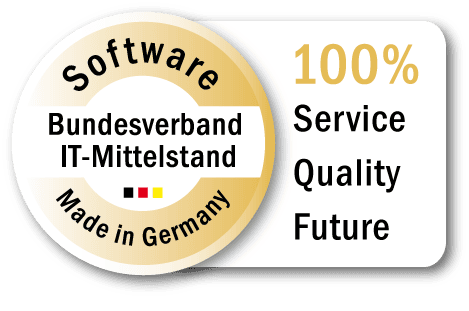Microsoft SQL Server is a leading relational database management system (RDBMS). It is used in a variety of enterprise applications across a wide range of industries, including manufacturing. In the era of Industrial IoT and increasing connectivity, Microsoft SQL is taking on an increasingly differentiated role in the factory. In this context, the following article highlights typical use cases and limitations of the popular database.
What is Microsoft SQL?
Microsoft SQL Server, originally introduced in 1989 and continuously developed since then, is a versatile database management system. It can be operated both on on-premises servers and in the cloud, for example in Microsoft Azure. The term “SQL” stands for Structured Query Language, a standardized language for managing and querying data in relational databases. With its advanced technology and cloud integration, Microsoft SQL Server is a robust solution for efficient data management and queries.
The advantages of Microsoft SQL in Industrial IoT
With a mature architecture and robust features, Microsoft SQL in Industrial IoT offers several advantages in terms of performance, security and scalability. Among other things:
- High performance and scalability: SQL Server offers high performance and can process data queries with speed and efficiency. This makes it particularly suitable for applications with high data loads. MS SQL also has the ability to scale with the requirements of growing company databases.
- Security: With various security features such as encryption and advanced auditing tools, SQL Server ensures the protection of business-critical data.
- Hybrid solutions: The ability to run SQL Server both on-premises and in the cloud enables hybrid scenarios and a smooth migration to the cloud.
- Integration: SQL Server integrates extensive business intelligence and analysis tools to analyze data and provide reporting insights into business processes.
- High availability: Functions such as always-on failover clusters and database mirroring guarantee constant data availability.
Microsoft SQL – Use-Cases in Industrial IoT
In manufacturing environments and in the Industrial IoT context, SQL Server provides a robust database to store and manage relational data securely and reliably. Here, the server is particularly useful due to its ability to model complex relationships between different data types and efficiently perform queries across multiple tables. This in turn supports the analysis and reporting in the following application examples:
- Traceability of product and process data along the value chain
- Monitoring and analysis of quality data, such as scrap and rework rates
- Tracking and analyzing work orders, working hours and materials used
- Tracking of stock movements and stocks
Cloud vs. on-premise server
Many of our customers already rely on cloud storage, partly due to its better scalability. The choice between on-premises and cloud-based SQL Server requires careful consideration of administration effort and costs. The decision depends on individual requirements, resources and budgets. In general:
- On-Premises: Complete control, but higher administration costs. High capital expenditure for hardware and maintenance.
- Cloud: Flexibility and scalability with minimal administration effort. Usage-dependent cost optimization, but pay attention to long-term expenses.
The limits of SQL in Industrial IoT: High-frequency time series data
The SQL server is less suitable for storing high-frequency time series (e.g. sensor data). Time series databases (e.g. influxdb) are much better suited here, as they are specially optimized for the efficient storage and retrieval of time-ordered data points. This is necessary to enable fast analysis of time-stamped data while making efficient use of storage space and resources.
Difference between relational and time series data
The main difference between relational and time series data lies in their structure and organization. Relational databases organize information based on tables with fixed relationships between data sets. In contrast, time series data points capture information chronologically over a period of time. In time series databases such as InfluxDB, data is organized into ‘measurements’, with each ‘measurement’ containing time-stamped tuples of timestamp and value. This structure enables efficient storage and retrieval of continuous time histories.
Advantage of time series databases
Time series databases are specialized in processing data quickly and efficiently over time and offer a constant input speed. Optimized for fast indexing of aggregated data over time, they enable stable performance. This is particularly important in applications with continuous data growth. In contrast, relational databases become slower as the amount of data increases due to indexes.
i-flow and Microsoft SQL – synergies in data processing
i-flow and Microsoft SQL offer a valuable combination for building a reliable, secure and powerful data infrastructure in the factory. i-flow serves as an interface for harmonizing heterogeneous data from production systems and transferring it to the MS SQL database. OT data (e.g. process data) can be enriched with data from IT (e.g. serialized parts list). For example, requirements for tracing product and process data can be implemented.
While i-flow serves as the link and data processor between operational IT and production systems, MS SQL provides the robust and secure database server.


